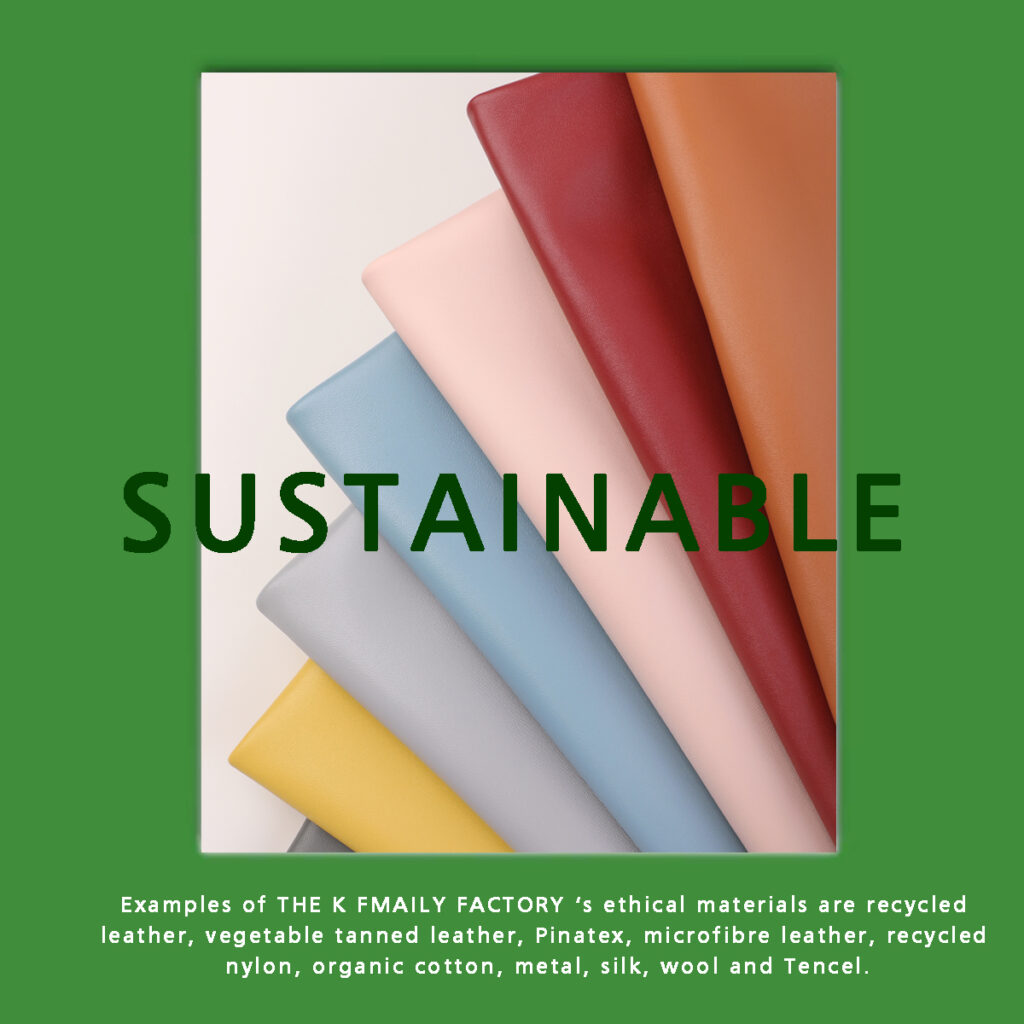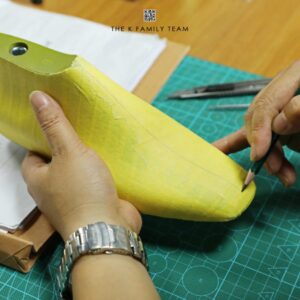As a professional custom footwear manufacturer serving luxury shoe brands, we understand that true excellence goes beyond design and craftsmanship — it also means responsibility. Today, more and more brands demand what is known as ethical and sustainable manufacturing. But what does that really mean? In essence, it’s about creating shoes that respect both people and the planet — using eco-friendly materials, fair labor practices, and production methods that minimize waste and pollution. From sourcing responsibly tanned leather to ensuring safe and transparent working conditions, sustainability is no longer just a trend — it’s the future of luxury footwear. In this article, we’ll guide you through the principles and practices behind Ethical and Sustainable Shoe Manufacturing.
Why Sustainability Matters in Modern Footwear
In today’s globalized and fast-paced market, the footwear industry faces serious environmental and social challenges. Over 20 billion pairs of shoes are produced annually, with a significant portion ultimately destined for landfills. Traditional shoemaking heavily depends on chemical adhesives, synthetic dyes, and petroleum-based materials — many of which are non-biodegradable and contribute to long-term soil and water pollution. Furthermore, the prevalence of global outsourcing has intensified concerns regarding labor rights, workplace safety, and fair trade across complex international supply chains.
That’s why sustainability and ethical manufacturing have become the new standards for modern luxury brands. Luxury is no longer defined only by price or craftsmanship — it also represents a commitment to responsibility and transparency. Many leading manufacturers now use vegetable-tanned leather, recycled rubber soles, and renewable fabrics while optimizing energy use and reducing carbon emissions throughout production.
Transparency in sourcing and fair treatment of artisans are also key to building trust in today’s conscious market. Modern consumers want more than just a stylish pair of shoes — they want products that reflect their values and ethics. In this sense, the brands that integrate sustainability into their design and manufacturing processes will lead the next evolution of the global footwear industry.
What Is Ethical and Sustainable Shoe Manufacturing?
Ethical manufacturing and sustainable manufacturing are not just buzzwords — they represent a complete system of responsibility built on three pillars: people, the environment, and the economy.
From a people-centered perspective, ethical manufacturing focuses on fairness, respect, and human dignity. It means providing safe working conditions, fair wages, and reasonable hours, while eliminating child labor and worker exploitation. In a truly ethical supply chain, every shoemaker is seen as an essential contributor to the brand’s value — their craftsmanship, creativity, and livelihood deserve recognition and respect.
From an environment-centered standpoint, sustainability is about minimizing ecological impact and conserving resources. This involves using renewable, biodegradable, or recycled materials, such as vegetable-tanned leather, water-based adhesives, and recycled rubber soles. It also includes reducing waste, cutting carbon emissions, and improving energy efficiency throughout production.
Finally, sustainability also encompasses economic responsibility — ensuring long-term growth through green supply chains, circular design, and sustainable business models that benefit both the company and society. In short, Ethical & Sustainable Shoe Manufacturing isn’t just about making beautiful shoes; it’s about making them responsibly, with care for people, the planet, and future generations.
Eco-Friendly Materials: From Leather to Vegan Alternatives
The shift toward sustainability in modern footwear begins with material innovation. From upgraded traditional leathers to plant-based and recycled alternatives, more brands are redefining luxury through environmental responsibility.
One of the most iconic examples is vegetable-tanned leather, a hallmark of Italian shoemaking. Instead of chemical agents, it uses natural tannins extracted from tree bark such as oak and chestnut. The result is durable, biodegradable leather with a rich texture and natural aging process. Similarly, recycled leather — made by reprocessing leftover leather scraps — helps reduce waste and carbon emissions while maintaining a premium look and feel.
Meanwhile, innovative vegan materials are becoming the new favorite of luxury brands. Options like Piñatex (pineapple fiber), corn-based fiber, and recycled plastics can replicate the appearance and texture of genuine leather without involving animal products. Leading fashion houses such as Gucci, Stella McCartney, and Prada have already launched sustainable collections using these materials, setting a new benchmark for eco-luxury.
Another key factor is transparency and traceability. Many high-end manufacturers now use blockchain or digital labeling systems to track a shoe’s entire lifecycle — from raw material sourcing to final production. This not only promotes environmental accountability but also strengthens brand trust and consumer confidence in responsible fashion.
Ethical Labor and Factory Standards
Within the framework of sustainable manufacturing, fair labor practices and factory standards form the foundation of social responsibility. Ethical shoemaking is not only about creating eco-friendly and high-quality products — it’s also about respecting and protecting the people behind them. A truly compliant factory follows international labor norms such as an 8-hour workday, no more than 40 hours per week, and two days off weekly. It must also ensure safe working conditions, with proper ventilation, protective equipment, and employee insurance for workplace injuries and healthcare — allowing artisans to work with both dignity and security.
Globally, more manufacturers are obtaining international certifications to demonstrate their commitment to ethical labor. Standards such as BSCI (Business Social Compliance Initiative), SA8000 (Social Accountability Standard), and WRAP (Worldwide Responsible Accredited Production) set strict requirements covering worker rights, safety, fair wages, non-discrimination, and environmental impact. These certifications have become essential benchmarks for global buyers when selecting production partners.
Both China and Italy are taking steps toward stronger social compliance in footwear manufacturing. Modern Chinese factories along the coast are adopting BSCI and ISO45001 management systems, while Italian workshops maintain transparency and collaborate with labor unions to protect artisan rights.
For luxury shoe brands, these standards are not optional — they are decisive. When selecting a luxury shoe production solution, brands increasingly prioritize manufacturers who uphold ethical labor practices and verified social compliance. Responsible production has become a symbol of true luxury, where craftsmanship and conscience coexist.
Sustainable Manufacturing Practices
In today’s footwear industry, sustainable manufacturing has become a key standard for measuring both brand responsibility and competitiveness. It goes beyond product quality — focusing on energy efficiency, environmental impact, and the transformation of production models.
The first priority is energy conservation and emissions reduction. Many factories are now adopting energy-efficient machinery and smart management systems to minimize power and fuel consumption. At the same time, they are implementing wastewater recycling and carbon emission monitoring systems, using purification equipment and renewable energy such as solar power to reduce pollution. For example, several Italian factories now use water-based adhesives and low-VOC materials in tanning and bonding processes, greatly lowering chemical emissions.
Italy’s traditional strength lies in its small-batch, handcrafted production model, which ensures unique quality and full traceability, even if it’s less efficient. By contrast, large-scale automated production offers speed and lower costs but often sacrifices environmental control and fine craftsmanship. The challenge for modern manufacturers is to find the right balance between these two approaches.
The future of sustainable footwear manufacturing lies in harmonizing efficiency and responsibility — using technological innovation to improve productivity while maintaining strict environmental and ethical standards. In doing so, factories can create not only profit but also a more sustainable planet for future generations.

The Role of Brands and Consumers
In the journey toward sustainable footwear, brands and consumers play equally vital roles. Brands are not only product creators but also messengers of values. More companies are now integrating design and transparency to communicate their sustainability efforts — using recyclable materials, low-carbon manufacturing, and clearly labeling packaging with information about material sources, carbon footprint, and production processes. This level of transparency builds trust and brand loyalty, allowing consumers to understand the full environmental journey of each pair of shoes.
At the same time, consumer choices are driving industry transformation. Green consumption has become a global trend, with more buyers prioritizing durable, eco-friendly, and ethically made products. According to sustainability reports, over 60% of younger consumers are willing to pay a premium for environmentally responsible brands. This growing awareness is pressuring companies to improve supply chains, adopt sustainable materials, and disclose production details.
Ultimately, the responsibility of brands and the awareness of consumers form a positive cycle: brands lead change through action, while consumers accelerate it through conscious choices — together shaping a more sustainable and responsible future for the footwear industry.
The Future of Sustainable Footwear
In the coming decade, the future of sustainable footwear will revolve around three key pillars: eco-consciousness, craftsmanship, and technology. Footwear manufacturing will evolve beyond the traditional mix of manual and mechanical processes toward a new era of smart manufacturing. With automation, IoT-enabled devices, and data-driven management systems, factories will be able to monitor energy consumption, material usage, and emissions in real time — achieving greater efficiency and a lower carbon footprint.
At the same time, AI-driven design is transforming the product development process. Artificial intelligence can analyze market trends, foot shape data, and comfort feedback to optimize materials and structural design, significantly reducing trial-and-error and prototype waste. Brands can now create and test new collections virtually, shortening production cycles and improving resource efficiency.
On the materials and craftsmanship side, the next generation of footwear will emphasize recyclability and circular design. Innovations such as bio-based materials, 3D-printed soles, and seamless construction techniques will enhance both comfort and sustainability.
Ultimately, the future of sustainable footwear is not just an ideal — it represents a new industrial paradigm that blends innovation, green materials, and masterful craftsmanship, paving the way for a fashion future where style and responsibility walk side by side.
FAQ
What makes a shoe manufacturer truly ethical?
They ensure fair wages, safe working conditions, reasonable hours, and transparent supply chains while minimizing environmental impact.
Are vegan leather shoes really more sustainable than real leather?
Not always. Plant-based vegan leathers (like pineapple or corn fiber) are eco-friendly, but PVC or PU types are not. Responsibly sourced vegetable-tanned leather can also be sustainable.
What certifications should I look for?
Key ones include BSCI, SA8000, WRAP, ISO14001, and Leather Working Group (LWG) — covering labor rights and environmental standards.
Can small brands afford sustainable production?
Yes. Many Italian and Asian factories now support low MOQs, allowing small brands to start with eco-friendly, small-batch production.
How can I verify ethical labor standards?
Check for valid certifications, audit reports, and transparency in policies. Ethical factories are open to sharing compliance documents or factory tours.





